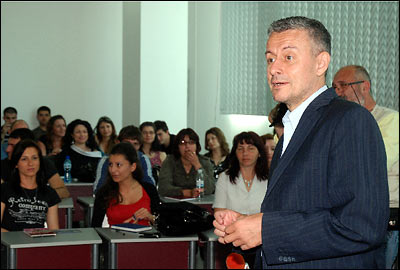
Ivan Petkov
GRReporter correspondent in Varna
The fifth international meeting of the Bulgarian media, which is taking place in Varna, has two themes. The first one is tourism and the media and how the economic crisis is affecting the tourism sector. I am taking part in the second part of this interesting forum, which is about the media development and more precisely about Bulgarian media abroad. During the first day of discussions the topic was new technologies and the media and they took place in two parts.
Bulgarian media during a crisis. Borders of admissibility. This discussion touched upon the basic problems of Bulgarian media abroad and examples were given about the different ways to get out of the crisis. Joseph Davidoff, Bulgarian media representative in Spain, appealed to the Bulgarian government to be more engaged. As an example he gave Romania, which has invested ?5 million in Spain, in order to help out publications in Romanian. Radosvet Radev from Darik radio spoke about preserving quality journalism, which needs to continue producing a quality media product after the crisis and during the shrinking advertising market. He forecasted that this year the advertising market will shrink with 50%.
The former Foreign Minister Solomon Passy said that during the crisis, Bulgaria could benefit from a bigger European integration and it should aim to decrease the “bad expenditures” at the expense of the “good expenditures.” Mr. Passy also shared some news. The first one had to do with the debate about accepting Iceland into the EU, where he said that “the Bulgarian “Yes” should not be taken as a constant.” He also said that Bulgaria needs to show some solidarity and to support the Turkish membership in the European Union.
The second news had to do with Solomon Passy’s offer for Bulgaria to be proposed as a Nobel Prize peace winner for saving Balkan Jews during the Second World War. The Bulgarian representatives in the US Evgeni Veselinov and Kina Bakovska talked about the attempt of the American media and the crisis details in the US. Chicago Tribune and Los Angeles Times were given as an example, which have been transformed only into online publications. The journalists also discussed the necessity for optimizing expenses and as an example they gave the merger between different international editorial offices, with the goal being to survive the crisis.
I will conclude my impressions from this part of the meeting with a quote by John Kerry, around which the participants of the conference united – print publications are a dying informational variety of humanity.
Digitalizing television: Made in BG. The previous discussionbrought agreement between the participants but this one provoked a more passionate exchange of opinions. Martin Zahariev explained in detail the dimensions and history of TV digitalization. The two hour and a half discussion was the playground of many representatives of different countries – representatives of SAITC (State Agency for Information Technology and Communications), representatives of the Austrian company ORS, which plans to invest in digitalizing in Bulgaria, media expert Georgi Lozanov, parliament member Ivo Atanasov, Dimitar Tzonev from BNT (Bulgarian National Television). Unfortunately, missing were representatives from the private media and CRC (Communication Regulation Commission).
The plan is for digitalizing the Bulgarian TV until the end of 2012. More or less, the participants of the discussion expressed their doubts that this deadline will not be kept and they predicted that a realistic deadline is 2015. Many technical and social question marks came up and one of the very important topics was the imperfections of the normative basis, which consists of many unclear points and a lack of regulated conditions. Commented was also the effect, which digitalization will have on the public interest and the freedom of speech. This discussion ended with the words that digitalization is something, which will happen because the exchange of old technologies with new ones is inevitable.